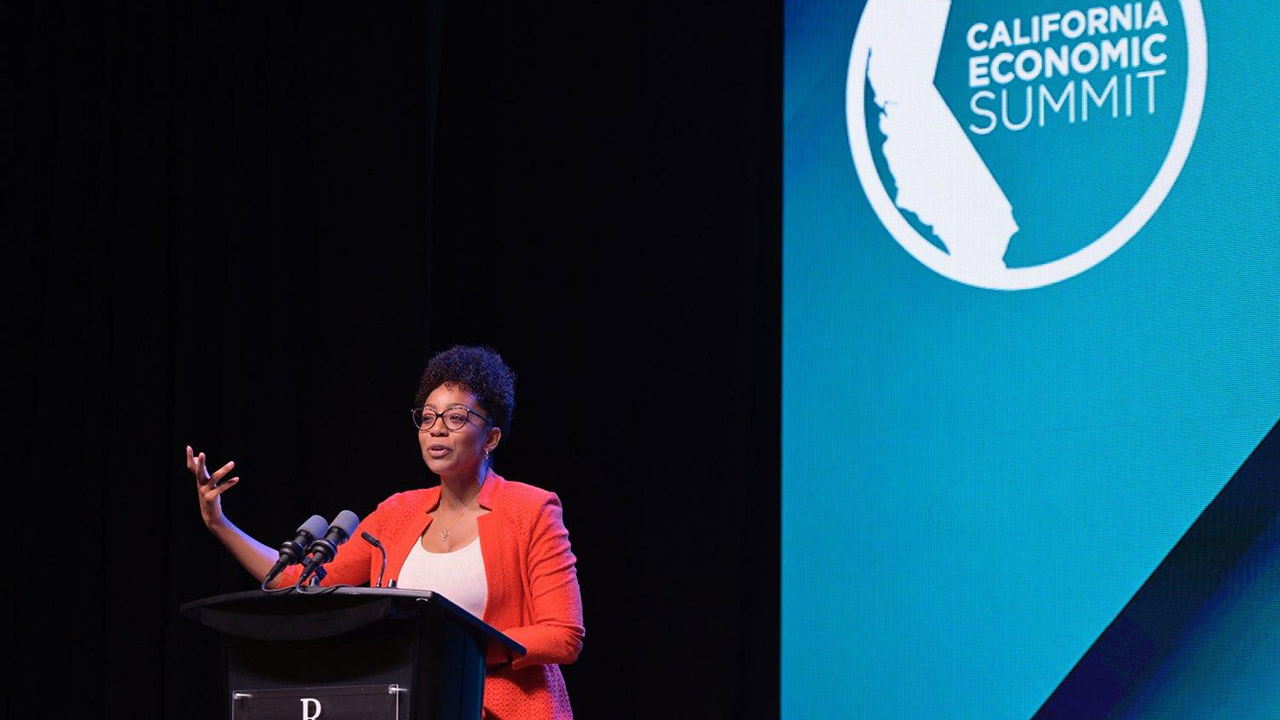
California Controller Malia Cohen (Photo: Roger Morales Photography/CA FWD)
California leaders addressed pressing issues such as housing, leadership priorities and challenges, community empowerment and the next generation of leaders on Day Two of the 2023 California Economic Summit, which was held this week in Indian Wells.
Regional Leadership
Inland Empire Economic Partnership’s Paul Granillo led a discussion with local leaders about their priorities in the Coachella and Imperial Valleys, especially with the growth of the energy sector. Palm Desert City Councilmember Jan Harnik’s priority is education, “In Palm Desert, we are pushing for our CSU that will serve this entire region, because we need those four-year degrees, and we also need strong community colleges.”
Brawley Mayor George Nava’s priority is to represent everyone, “If you want to do this job well, you have to be a good politician and that means listening to the public, listening to residents, listen to industry and listening to the folks who are working.” Imperial County Supervisor Ryan Kelley agreed, “How do we balance the needs of so many constituents and different points of view? Just be available, to listen and to make an impact where you can that benefits the majority, that’s what I try to do.” Supervisor Kelley is optimistic about the region’s future, “I feel confident that the community, our jurisdictions are all engaged to make sure that is going to have a positive impact for our valley and be an economic engine that benefits us and doesn’t displace anything that we currently have.”
YLAC and Future Leaders
CA FWD’s Young Leaders Advisory Council held a pre-Summit event to inspire and empower the next generation of leaders to voice their priorities, which included Education and Workforce, Mental Health, Climate and Housing. YLAC members joined the stage to expand on their priorities for the future. “This is such a diverse pool of voices when it comes to racial groups, income status, immigration status and I think that’s something that we should really hone in on, both learning from each other and learning from young person to young person, but also intergenerationally,” said YLAC member Fiona Lu. “What we bring to the table, is the privilege of time,” added Morgan Fellow Semi Cole. “As young people, we’re at this developmental period where we have this enduring passion.”
California Controller Malia Cohen
Controller Malia Cohen discussed the administration’s efforts in the region. “In the face of high poverty and unemployment in this region, the (Lithium Valley) industry can really be transformational, and I want you to know that I genuinely support this region’s efforts to capitalize on this new industry and support this great new growing economic opportunity,” said Controller Cohen. As a member of the California Alternative Energy and Advanced Transportation Financing Authority, she announced the agency approved a $10 million sales tax exclusion for the Hell’s Kitchen Lithium Production and Clean Power Project, which could bring 480 construction jobs and 940 family-sustaining jobs.
Equity Research Institute Report
Dr. Manuel Pastor, Professor of Sociology and American Studies at the University of Southern California, offered advice to tackle the multiple crises including backlash to racial diversity, income inequality and climate. “It’s important to think about your role as stewards of the state — not just clusters but community, not just recovery but re-imagination, not just jobs but justice.”
Empowering Communities
As California focuses on regional economic development through California Jobs First (formerly CERF), those working in communities traditionally left behind want to ensure that equity is embedded in any plan moving forward. “Inequality costs money,” said Luis Olmedo, Executive Director of Comite Civico de Valle, Inc. “But inequality is not willing to pay.” Sergio Carranza of the Sacramento Area of Governments added, “It’s really important that before we start thinking about what kind of economic approaches or strategies, we need to implement to improve opportunities for everyone, we really need to understand the culture of the families and the people that we serve.” Kate Anderson of the Agua Caliente Band of Cahuilla Indians stressed education, “We look at the opportunities to build inclusive communities the importance of higher education, promoting the opportunities to earn a higher education degree and access to those opportunities.”
Best Practices Housing and Homeownership
It’s no secret that California needs more housing to alleviate the housing crisis, but there are roadblocks to create the number of units needed. Today’s panel discussed what steps could be taken to increase housing supply and homeownership. One issue, according to Omar Cobian of the Southwest Mountain States Regional Council of Carpenters, is wages in the construction industry “so that the workers that are working and building these homes can actually afford the live in the homes they’re building – we have a wage problem in the industry.” Evan Schmidt, Valley Vision CEO, spoke about a new program, “Green Means Go.” It addresses the housing shortage, the need to address greenhouse gas emissions and advances inclusive and equitable economic growth. Jake Wuest of FirstBank California described a program for first-time homeowners which distributed $3 million to 200 African American families.
Thank you to all who attended and participated in making the 2023 California Economic Summit a success. We look forward to seeing you next year at the 2024 Summit!

